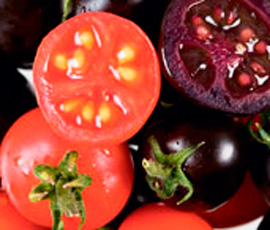Scientists sequence tomato genome

The successful sequencing of the tomato genome is likely to improve yield, nutrition, disease resistance, taste and colour of tomatoes and other related crops.
For the first time, a team of 300 international scientists have decoded the genome of the tomato, Solanum lycopersicum, and its wild ancestor, Solanum pimpinellifolium.
This achievement, by The Tomato Genome Consortium (TGC), will help breeders to identify important tomato genes allowing them to deliver new varieties more quickly and efficiently.
In total, 35,000 tomato genes were identified in the study, arranged on 12 chromosomes, or “packages” of DNA.
Scientists believe the genome will boost conventional breeding techniques over genetic modification.
The genome will help breeders to deliver tomatoes with beneficial traits like improved taste and higher concentrations of nutrients, like lycopene, which are believed to have health benefits.
Having the genome sequence could also lower costs by helping us develop tomatoes that are better equipped to combat the pathogens, droughts and diseases that plague growers. Developing better tomatoes will help to ensure global food security.
In the UK, the market for tomatoes is worth around £625m a year. But, by benefitting breeders of other crops in the Solanaceae family like potatoes, peppers and aubergines, the genome could be more valuable still.
“Tomatoes are one of the most important fruit crops in the world, both in terms of the volume that we eat and the vitamins, minerals and other phytochemicals that both fresh and processed tomato products provide to our diets,” said Graham Seymour, Professor of Biotechnology at Nottingham University, one of the 300 scientists involved in the TGC.
“The tomato is also the model plant we use to investigate the process of fruit ripening, so understanding this genome will help us unravel the molecular circuits that make tomato and other fruits ripen and give them their health promoting properties.”
Information obtained from the tomato genome could be used to improve the quality of other fruits. Strawberries, apples, melons, bananas and other fleshy fruits share a number of tomato traits.
The tomato now joins a growing number of crop plants with genome sequences available for plant researchers that include rice, maize, sorghum, poplar, potato, soybean, strawberry cucumber and grape.
